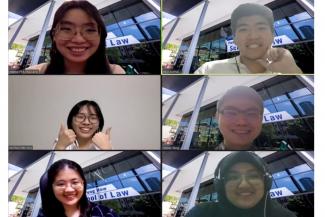
As part of the cross disciplinary SMU-X module – Digital Innovation for Access to Justice – a team of Singapore Management University (SMU) students participated in the Iron Tech Lawyer Invitational 2021, with the SMU Pro Bono Centre (PBC) as project sponsor. Competing with 16 other university teams, they triumphed as 2nd prize winners in the competition after several rounds of presentations.
It is the first time a Singapore university has taken part in the Iron Tech Lawyer Invitational, which started in 2013 as a US-based challenge to help improve the civil justice system using data driven solutions. The competition was opened to international entries in 2020, requiring student teams from around the world to showcase legal tech and data analysis tools they have developed to improve access to justice. Tools developed must be completed for a pro bono organizational client.
The SMU team partnered with PBC and the Supreme Court’s Office of Transformation and Innovation (Justice) to identify the problem statement. Currently, the probate application is a complex procedure due to complicated legal language, text heavy guides, missing explanations and the lack of any personal touch. Applicants often lack awareness of processes and which forms to complete, resulting in avoidable errors and much time wasted. Costs quickly add up if lawyers are engaged.
To alleviate this issue, the team developed a mobile-friendly DIY app which takes users through the probate process, step-by-step. In the midst of managing other academic modules, the team took just 13 weeks to develop the app to simplify the probate application process, including user testing and feedback-based improvements.
The team’s solution earned them 2nd place in the finale, held virtually on 30 April. Projects were evaluated by a panel of experts in access to civil justice, legal design and technology, taking into consideration factors like usability, sophistication, scalability, sustainability, impact, and the solution’s ability to address the client-organization’s needs.
Team leader, Teo Sijing, YPHSL, Year 4, said "Two unique challenges (and strengths) of the module were its interdisciplinary nature, and the inaccessibility of laws and the legal process. Students from both the School of Computing and Information Systems (SCIS) and Yong Pung How School of Law (YPHSL) had to converse and think from the perspective of the other for a meaningful collaboration. We spent many nights on Zoom to develop a product greater than just a sum of our parts. We also had to deal with how the justice system was less accessible to a part of our targeted users, for which testing and feedback were immensely useful. It was alarming to be constantly reminded of the inaccessibility of legal language and processes. We thus put in special effort in tweaking the app based on feedback gathered from various parties, to best cater to persons from all walks of life."
Lim How Khang, SMU Assistant Professor of Law and Computer Science, who supervised the team in the project said “The students had a very short runway but they did a phenomenal job. None of them were familiar with the probate application process and they also had to learn to use the software tools to develop their eventual solution. Looking at the app they developed, it was evident that they spent a lot of time figuring out the probate process with deep empathy for the layperson end-user. To have developed a complete solution of this level of detail and thoughtfulness within a busy semester demonstrated great teamwork and project management skills, and the team thoroughly deserved the podium finish.”